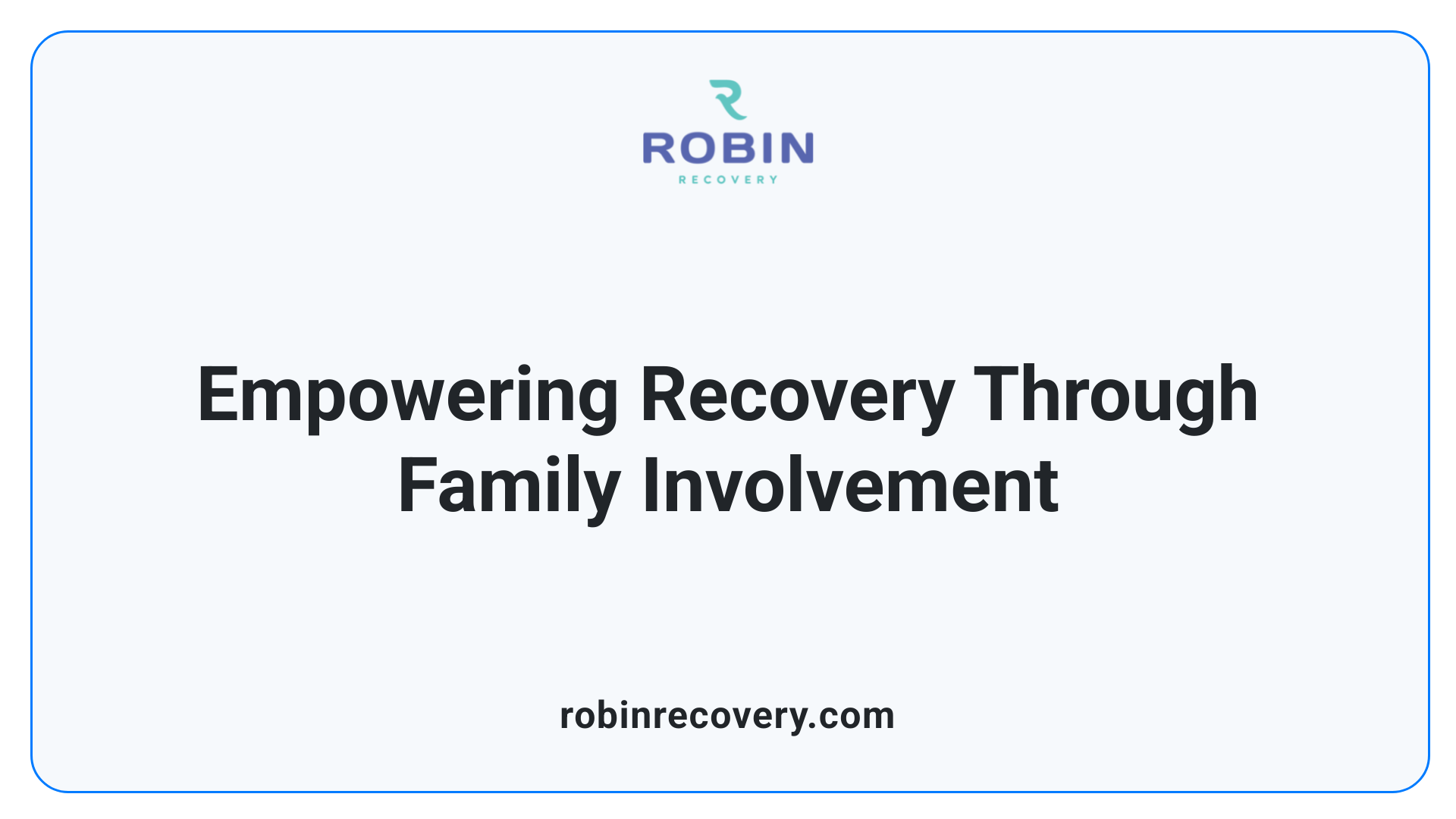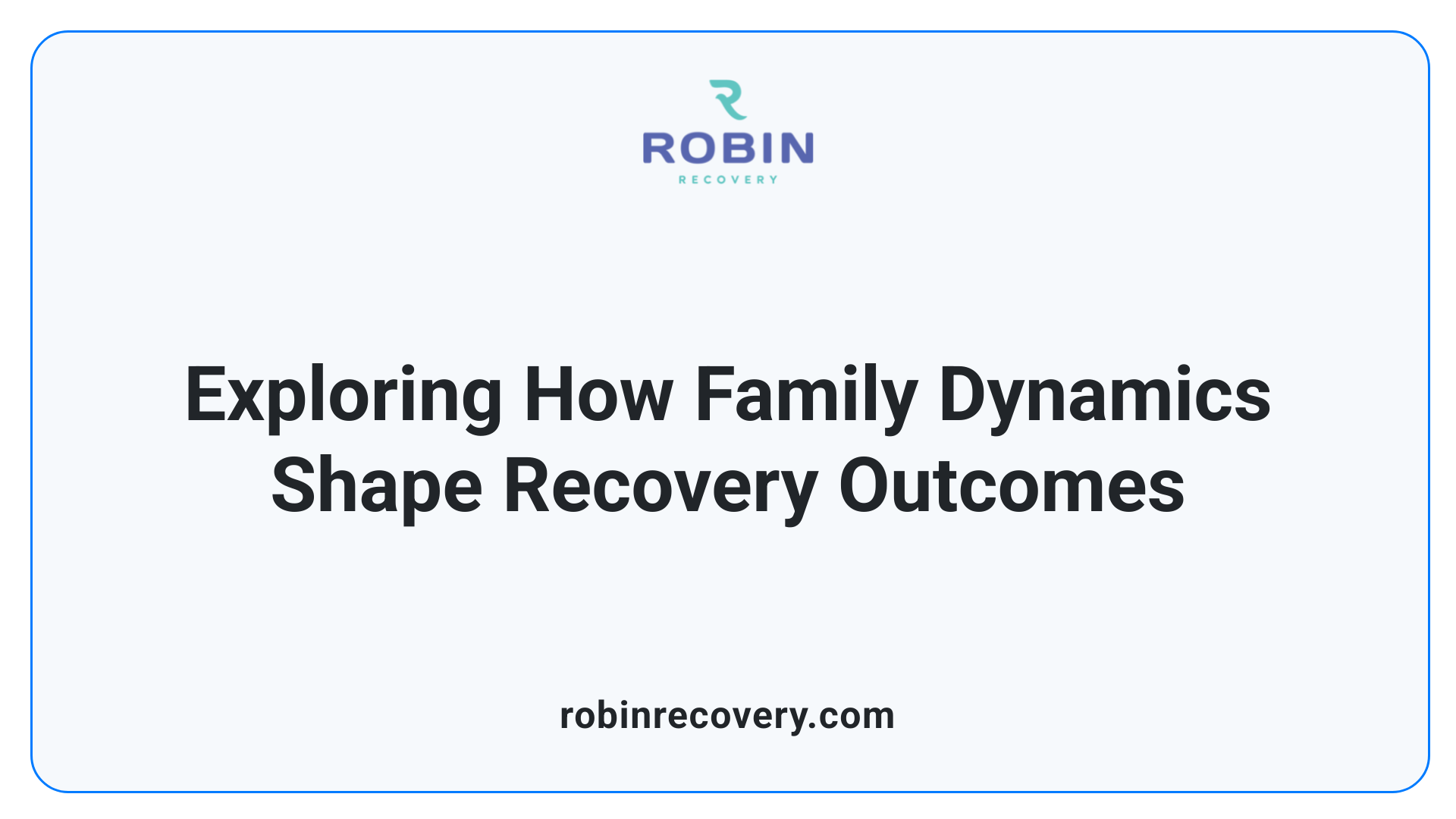The Role of Family Support in Intensive Outpatient Programs

Introduction
Intensive Outpatient Programs (IOPs) have emerged as valuable treatment options for those struggling with addiction and mental health issues. Unlike residential therapy, IOPs offer structured treatment schedules that allow individuals to maintain daily responsibilities, signifying the importance of an external support system, particularly family involvement, to enhance recovery outcomes. This article delves into the critical role family support plays in reinforcing the effectiveness of IOPs.
The Crucial Role of Family Involvement in IOPs

Why is it important to involve the family in the treatment process?
Involving the family in the treatment process is crucial as it strengthens the family system and provides essential support for the client’s recovery. Engaged family members can motivate the client to stay committed to their treatment and make positive changes. This support creates accountability and reinforces a dedication to the recovery journey, which is invaluable in environments like Intensive Outpatient Programs (IOPs).
Additionally, when families participate in the recovery process, they gain a better understanding of addiction and mental health disorders. This increased knowledge fosters empathy and encourages a more supportive environment that is conducive to recovery. Families not only help in recognizing signs of potential relapse but also offer immediate emotional support, creating a safer and more manageable home environment for their loved ones.
Research has shown that techniques such as Motivational Interviewing and the implementation of motivational incentives can further enhance treatment engagement and retention, leading to improved outcomes. Moreover, the emotional and practical assistance from family members helps alleviate feelings of isolation for the individual in recovery, which is fundamental for their progress. Overall, family involvement not only aids individual recovery efforts but also promotes healthier family dynamics.
Additional Considerations for Family Support
To illustrate the significant impact of family support in IOPs, consider the following benefits:
BenefitDescriptionImpact on RecoveryEnhanced Communication Improved skills among family members to discuss challenges. Reduces misunderstandings, fostering a supportive atmosphere. Accountability and Motivation Family members encourage commitment to treatment goals. Higher adherence to programs and improved success rates. Conflict Resolution Safe spaces for families to address issues effectively. Strengthens family bonds, promoting a nurturing environment.
By integrating family support into treatment plans, IOPs create a holistic approach to recovery, emphasizing the importance of having a strong foundation of love, understanding, and encouragement.
Family Support and Mental Health Recovery
What is the role of family support in mental health recovery?
Family support plays a vital role in mental health recovery, particularly in overcoming depression. It provides emotional stability, practical assistance with daily tasks, and encouragement to seek and adhere to professional treatment. Families can foster an understanding environment by educating themselves about the condition and promoting healthy habits, which can significantly alleviate feelings of isolation often experienced by those with depression.
Open communication within the family unit helps maintain connections and prevents social withdrawal, which can worsen symptoms. Families can also be instrumental in recognizing early warning signs of relapse, allowing for timely intervention.
Ultimately, a strong family support system can be a cornerstone for effective recovery and well-being. By participating in family therapy and educational sessions offered in Intensive Outpatient Programs (IOPs), families develop skills to navigate challenges together, strengthening their bonds and enhancing overall treatment efficacy.
Overall, family support integrates emotional understanding, accountability, and practical assistance, which are crucial components driving recovery pathways.
Contributions of Family Support to Treatment Journeys

How does family support contribute to an individual's mental health treatment journey?
Family support plays a critical role in an individual's mental health treatment journey by offering emotional stability and encouragement. This is particularly important for those recovering from conditions such as addiction and depression. The presence of family members often acts as a motivational force, pushing individuals to embrace the therapeutic process fully.
Impact of open communication
Open communication within the family creates avenues for healthy dialogues that have a profound impact on mental health and personal development. Through such discussions, family members can express concerns, share experiences, and reinforce the commitment to recovery. However, it’s essential to navigate these conversations carefully, as well-intentioned behaviors can sometimes lead to enabling dynamics that may inadvertently affect relationships.
Supportive family dynamics
Supportive family dynamics provide a conducive environment for healing. These dynamics help in recognizing early warning signs of relapse, facilitating timely interventions. Enhanced understanding and empathy fostered through education about mental health and addiction issues empower family members to contribute positively. Overall, family involvement enriches the treatment experience, leading to improved outcomes and sustainable recovery paths.
Creating a Supportive Family Environment for Recovery

What are practical ways for families to foster a supportive environment for recovery?
Families can foster a supportive environment for recovery by actively participating in treatment processes and maintaining open communication with treatment providers.
Engaging in family therapy can help improve relationships and equip family members with tools to cope with the challenges of addiction. It's essential for family members to understand the complexities of addiction through educational resources. This knowledge reduces feelings of isolation and enhances empathy toward the recovering individual.
Encouraging positive behaviors serves as another effective strategy. Family members can act as accountability partners, motivating their loved ones to adhere to recovery plans. Additionally, establishing a healthy home environment is crucial, as it allows monitoring of potential triggers that may lead to relapse.
Finally, celebrating milestones in recovery fosters motivation and reinforces progress. By applying these strategies, families can significantly enhance the success of their loved ones undergoing Intensive Outpatient Programs (IOPs), promoting long-term recovery and healthier relationships.
Family Dynamics and Their Influence on Outcomes

How do family dynamics affect treatment outcomes and relapse rates?
Family dynamics play a crucial role in shaping the outcomes of addiction treatment and the likelihood of relapse. Supportive relationships within a family can significantly bolster emotional, physical, and economic support for individuals in recovery. When families foster healthy communication and accountability, treatment adherence improves. Conversely, unhealthy family dynamics can increase the risk of mental health challenges and substance misuse.
Research indicates that when family members actively participate in the recovery process, individuals in Intensive Outpatient Programs (IOPs) experience lower rates of hospitalization and relapse. This engagement helps mitigate feelings of isolation and shame, creating a safer, more nurturing environment for recovery.
What is the distinction between healthy and unhealthy family dynamics?
Healthy family dynamics are characterized by open communication, mutual respect, and effective conflict resolution. In contrast, unhealthy dynamics may include conflict, misunderstanding, and emotional neglect, which can hinder recovery efforts. Healthy relationships provide a secure base for individuals to navigate their recovery, while unhealthy interactions can contribute to stress and relapse.
What is the role of family therapy in promoting positive dynamics?
Family therapy is pivotal in IOPs, aiming to improve family communication and address underlying issues. These therapy sessions provide a safe space for family members to share feelings, resolve conflicts, and educate themselves about addiction and mental health disorders. By fostering understanding and reducing stigma, family therapy strengthens relationships and enhances overall recovery outcomes.
Engaging families in therapeutic processes allows them to evolve into active supporters, holding individuals accountable and motivating them through their recovery journey.
Incorporating Family Therapy into IOPs
What are the benefits of incorporating family therapy into Intensive Outpatient Programs (IOPs)?
Incorporating family therapy into Intensive Outpatient Programs (IOPs) offers numerous benefits that enhance treatment effectiveness. By including family members in the therapeutic process, individuals receive essential support that minimizes feelings of isolation and promotes connectedness, validation, and gratitude.
Family therapy fosters improved communication and problem-solving strategies, reinforcing a supportive home environment that is vital for recovery. This environment helps to address misunderstandings and conflict that can arise from addiction or mental health issues, leading to healthier family dynamics.
Moreover, families learn how to effectively support their loved ones, which is crucial for maintaining mental health outside of therapy and preventing relapse. Education provided during family therapy sessions equips families with the knowledge to recognize triggers and set healthy boundaries, thereby enhancing the recovery process.
Data show that youths and young adults who engage in family therapy experience higher treatment completion rates and longer durations in IOPs. This underscores the positive impact of family involvement on overall treatment success, showcasing that a strong support system is a vital component in addiction recovery.
How does family therapy improve communication?
Family therapy enhances communication by fostering an atmosphere where family members can openly express their feelings, concerns, and aspirations. These sessions provide a safe, structured environment for discussing difficult topics, promoting understanding and reducing conflict.
What is the role of family therapy for youth?
Family therapy plays a critical role for youth in recovery, as it reinforces the connection between the individual and their family. Engaging family members helps to establish accountability and reinforces commitment to treatment. With young individuals facing unique challenges, family involvement is instrumental in creating a supportive foundation for their ongoing development and recovery.
Addressing Challenges and Building Support

Managing Family Expectations
Family members supporting a loved one through recovery often face high expectations. It can lead to stress and disappointment if progress is slower than anticipated. Clear communication about recovery's ups and downs is essential. Families should be encouraged to maintain realistic expectations and celebrate small milestones instead of only focusing on the end goal.
Setting Boundaries
Establishing healthy boundaries allows family members to support their loved ones without feeling overwhelmed. It is vital to protect emotional well-being while also fostering accountability in the individual in recovery. Families should collaboratively define limits that support recovery goals while also prioritizing self-care.
Cultural Barriers in Recovery
Cultural beliefs can influence family dynamics and perceptions of addiction and mental health. Some cultures may stigmatize these issues, complicating open communication about recovery. Education and open discussions can reduce misunderstandings and create a more empathetic and supportive environment for those in treatment.
The Holistic Healing Framework in IOPs
Mind, body, and spirit connection
Intensive Outpatient Programs (IOPs) adopt a holistic healing framework that emphasizes the interconnectedness of mind, body, and spirit. This approach addresses not just the symptoms of addiction and mental health issues but also the underlying emotional challenges. By integrating various therapeutic techniques, IOPs aim to foster emotional well-being, physical health, and spiritual growth, which greatly enhance the recovery experience.
Community and peer support
Community engagement plays a vital role in the IOP recovery process. Peer support groups form an essential component, allowing individuals in treatment to share their experiences and build authentic connections. These interactions create a sense of belonging, reinforcing the idea that individuals are not alone in their struggles, thereby promoting resilience and motivation.
Long-term recovery success
Through this holistic approach, IOPs significantly improve long-term recovery outcomes. Those who benefit from a supportive environment—including strong family and community ties—are more likely to maintain sobriety. The positive influence of family members, alongside community support, fosters accountability and commitment, vital for sustained recovery.
Conclusion
Family support is an indispensable element of Intensive Outpatient Programs, providing the emotional and practical foundation necessary for successful recovery outcomes. The integration of family in these programs not only enhances the individual healing process but also strengthens familial relationships, promoting resilient and understanding home environments. As IOPs continue to highlight family involvement, the journey towards recovery becomes a shared responsibility, fostering compassionate connections that lead to lasting change.
References
- The Role of Family in Intensive Outpatient Programs (IOP)
- The Role of Family in an IOP: Supporting Sobriety and Mental Health
- The Role Of Family In Intensive Outpatient Treatment
- The Role of Family in the Success of IOP Treatment
- The Role of Family in Intensive Outpatient Programs (IOP)
- The Role of Family In Mental Health Outpatient Treatment
- The Role of Family Support in Intensive Outpatient Programs – Core ...
- The Role of Family in Intensive Outpatient Programs (IOP) - IBM
- The Role of Family Support in Outpatient Addiction Treatment
